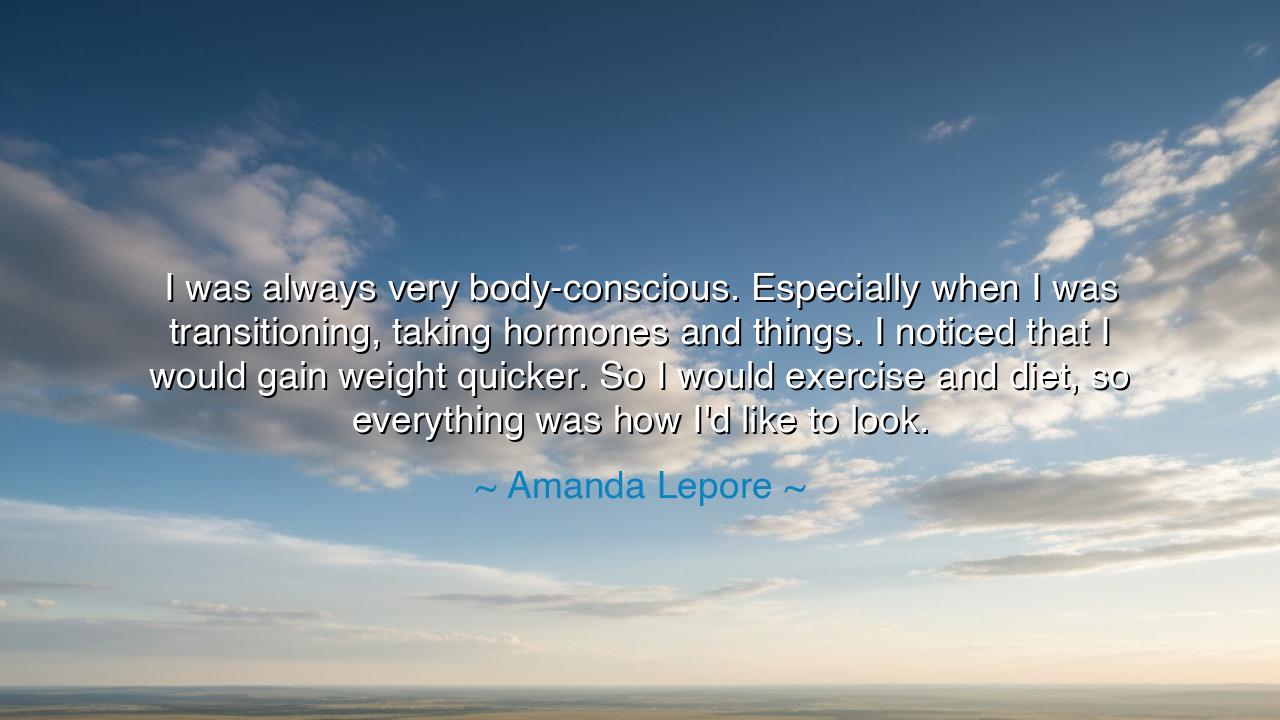
I was always very body-conscious. Especially when I was
I was always very body-conscious. Especially when I was transitioning, taking hormones and things. I noticed that I would gain weight quicker. So I would exercise and diet, so everything was how I'd like to look.






In the words of Amanda Lepore, “I was always very body-conscious. Especially when I was transitioning, taking hormones and things. I noticed that I would gain weight quicker. So I would exercise and diet, so everything was how I’d like to look,” we find a testimony not only of transformation, but of courage, self-awareness, and the eternal quest for harmony between body and spirit. These words do not speak merely of the flesh—they speak of the soul’s struggle to mold its outer vessel into the shape of its inner truth. Lepore’s journey, like those of the heroes and heroines of old, is not one of vanity, but of becoming—of reclaiming her own image from the hands of fate and sculpting it through will and devotion.
To be “body-conscious” is, in truth, to be awake—to feel the currents of life that flow through the body and to recognize it as both a gift and a responsibility. The ancients taught that the body is the temple of the soul, the visible reflection of the invisible self. Yet for some, that temple is not built as the heart imagines it. Thus begins the sacred labor of transformation, the shaping of form to align with essence. In Lepore’s words, we hear the voice of one who undertook this labor not in vanity, but in reverence—for to transition is to bring the outer self into union with the inner, to make harmony where once there was dissonance.
Her journey through hormones, exercise, and diet was not a mere physical pursuit; it was a pilgrimage. Just as the blacksmith tempers iron in fire and water to create a blade of beauty and strength, she tempered herself through discipline, patience, and resolve. The body, she reminds us, is not static—it responds, adapts, and transforms according to the will that guides it. To master it, one must walk the path of balance, where effort is matched with compassion, and striving is softened by self-acceptance. This delicate dance between creation and surrender is the essence of all great art, and Lepore’s art was the creation of her own being.
Consider the legend of Pygmalion, the sculptor who carved from marble a woman so beautiful that he fell in love with her. When the gods saw his devotion, they breathed life into his creation, transforming stone into living flesh. So too does Amanda Lepore’s story echo that myth—not in the literal crafting of another, but in the crafting of herself. Through her care, her discipline, and her relentless pursuit of the image her heart saw as true, she transformed her own form into a living masterpiece. The gods, it seems, still favor those who labor with love and courage, for she, too, breathed life into her vision.
Her diet and exercise, the tools of her transformation, were not instruments of punishment, but of purpose. She did not seek to fit the world’s image, but her own. In this, her wisdom reflects that of the ancient Stoics, who believed that mastery begins within—that the true sage governs herself with order and intention. The one who disciplines her body disciplines her will; the one who shapes her form shapes her destiny. Lepore’s devotion to her body was, therefore, an act of reverence for her own truth—a declaration that she, and she alone, would determine how she would appear to the world.
Yet there is also a gentle sorrow in her words, for to be body-conscious is to walk a line between creation and critique. It is to hold oneself beneath the gaze of one’s own expectation. But the wise understand that self-creation need not be self-condemnation. The ancients taught that the mirror is both a teacher and a test—what we see reflected is not merely flesh, but spirit. Lepore’s awareness of her form, her careful attention to diet and movement, is the practice of one who has learned to see the body not as an enemy, but as a sacred canvas—ever changing, ever alive.
Let this teaching endure: that transformation, whether of flesh or of spirit, is a holy work. Those who seek to become themselves must walk with both discipline and compassion. Exercise not to perfect, but to express. Eat not to punish, but to nourish. Change not to escape who you are, but to reveal what you have always been. In this way, the work of the body becomes the song of the soul.
Thus, the wisdom of Amanda Lepore becomes clear: the outer self is a reflection of the inner truth, and through awareness, care, and devotion, one may align the two. Her path teaches that self-mastery is not vanity, but reverence; not pride, but purpose. And to those who walk their own roads of change—whether of body, heart, or spirit—her words whisper the same eternal truth that the ancients once knew: that to shape oneself is not to defy nature, but to fulfill it, for every soul is an artist, and life itself is the canvas of transformation.






AAdministratorAdministrator
Welcome, honored guests. Please leave a comment, we will respond soon